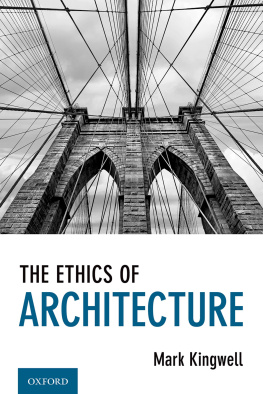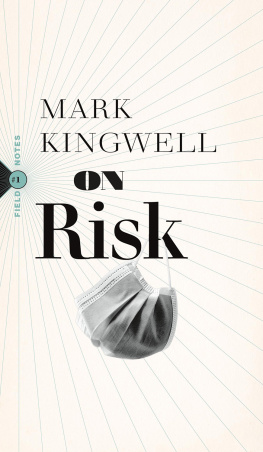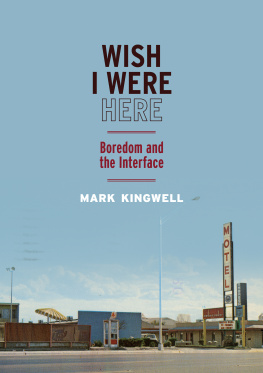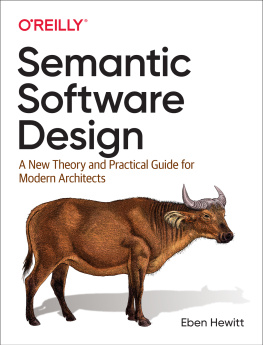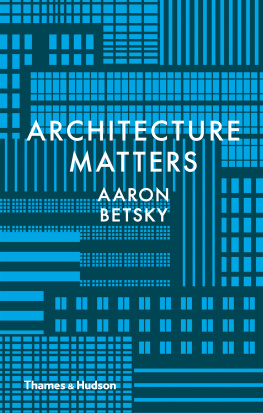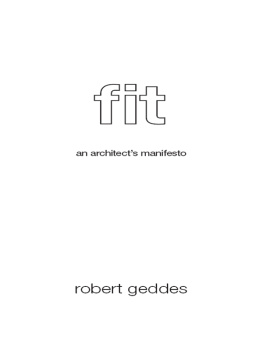The Ethics of Architecture
ETHICS IN CONTEXT
Series Editor
Markus D. Dubber
Professor of Law and Director, Centre for Ethics
University of Toronto
Published under the auspices of the Centre for Ethics, University of Toronto, Ethics in Context explores the ethical dimensions of interesting, provocative, and timely questions. Books in the series are accessible, yet provide something rigorous that stimulates thought and debate, in keeping with the interdisciplinary and inclusive vision that animates the Centre for Ethics at the interface between academic research and public discourse.

Oxford University Press is a department of the University of Oxford. It furthers the Universitys objective of excellence in research, scholarship, and education by publishing worldwide. Oxford is a registered trade mark of Oxford University Press in the UK and certain other countries.
Published in the United States of America by Oxford University Press
198 Madison Avenue, New York, NY 10016, United States of America.
Mark Kingwell 2021
All rights reserved. No part of this publication may be reproduced, stored in a retrieval system, or transmitted, in any form or by any means, without the prior permission in writing of Oxford University Press, or as expressly permitted by law, by license, or under terms agreed with the appropriate reproduction rights organization. Inquiries concerning reproduction outside the scope of the above should be sent to the Rights Department, Oxford University Press, at the address above.
You must not circulate this work in any other form and you must impose this same condition on any acquirer.
Library of Congress Cataloging-in-Publication Data
Names: Kingwell, Mark, 1963 author.
Title: The ethics of architecture / Mark Kingwell, Department of
Philosophy, University of Toronto.
Description: New York, NY : Oxford University Press, 2021. |
Includes bibliographical references and index.
Identifiers: LCCN 2020039408 (print) | LCCN 2020039409 (ebook) |
ISBN 9780197558546 (hardback) | ISBN 9780197558560 (epub) |
ISBN 9780197558553 (updf) | ISBN 9780197558577 (digital-online)
Subjects: LCSH: ArchitecturePhilosophy. | ArchitectureMoral and ethical aspects.
Classification: LCC NA2500 .K49 2020 (print) | LCC NA2500 (ebook) | DDC 720.1dc23
LC record available at https://lccn.loc.gov/2020039408
LC ebook record available at https://lccn.loc.gov/2020039409
DOI: 10.1093/oso/9780197558546.001.0001
Note to Readers
This publication is designed to provide accurate and authoritative information in regard to the subject matter covered. It is based upon sources believed to be accurate and reliable and is intended to be current as of the time it was written. It is sold with the understanding that the publisher is not engaged in rendering legal, accounting, or other professional services. If legal advice or other expert assistance is required, the services of a competent professional person should be sought. Also, to confirm that the information has not been affected or changed by recent developments, traditional legal research techniques should be used, including checking primary sources where appropriate.
(Based on the Declaration of Principles jointly adopted by a Committee of the
American Bar Association and a Committee of Publishers and Associations.)
You may order this or any other Oxford University Press publication by visiting the Oxford University Press website at www.oup.com.
Contents
Without Architecture
There would have to be another vision for occupying space,
new rituals for sitting and standing, for the physical interruption
of the planar world. No longer would we distinguish
betweenexist and inhabit. No asking where we live.
We live. Now to lug our dwellings like a hermit crab
or not. What would the word for shelter be?
Likecave or under-hang, or more like shade or company?
Two hundred words for horizon comprise an anthem.
Without walls, privacy would still occur, only wilder.
We would vote by standing upright, and emphasize
ourselves by raising our hands, lengthening our votes
as a challenge to the levelness of the meeting place.
Prisons would be nothingbut banishment theoretical and severe:
how best to find a cave or shade beyond the vanishing point?
And who goes there? It was the heretic and prodigy who said:
I can make a cathedral of my condition and worship there.
Paul Vermeersch, from Self Defence for the Brave and Happy: Poems (Toronto: ECW Press, 2018)
***
Being human is itself difficult, and therefore all kinds of settlements (except dream cities) have problems. Big cities have difficulties in abundance, because they have people in abundance.
Jane Jacobs, from The Death and Life of Great American Cities (New York: Random House, 1961)
Some years ago I wrote a book about millennial anxiety that concluded with an affectionate description of the Canadian city, Winnipeg, where I spent seven years of my life before heading off to college. Recalling the annual waves of floods, blizzards, tent-caterpillar infestations, and summer hailstorms that battered trees and cars into failure, I labeled the town known officially as The Gateway to the West as Plague City. It is indeed a bleak and forbidding place, where the sidewalks crack from deep winter cold snaps and summer seems to last about a month. Not surprisingly, its longtime residents are resilient, friendly, and cooperative. They look out for each other. The rest of us take the first viable opportunity to move somewhere less hostile to human existence.
The year 2020 has seen most of the worlds cities transformed with startling swiftness into new versions of a genuine Plague City, not just a Midwestern town beset by routine environmental events. The novel coronavirus outbreak that likely started in wet markets in China spread with deadly speed and virulence across the planet, creating global pandemic conditions unprecedented in human history, even including the 1918 Spanish Flu, the 1665 Great Plague, or the Black Death. The final death tolls may prove smaller than those world-historical crisesone hopes substantially smallerbut the overall social and economic effects are larger, and will continue longer, than anything the world has witnessed before.
I had just completed the main manuscript of this book when news of the virus and its wildfire COVID-19 infections were beginning to take hold in mainstream consciousness. Everyone will recall that there was a period of six weeks or more, roughly all of February and at least half of March 2020, when most North Americans and many Europeans acted as if the virus was containable, and hence ignorable, in the same way that earlier SARS and MERS outbreaks had been. There was a sense that extreme measures were unwarranted if not hysterical, and some commentators insisted the disease was less worrisome than the annual flu. By early April, of course, the world had decisively and permanently changed. As the first weeks of social distancing and lockdowns grew into months, it became clear that nothing in our world would ever be the same.
This is especially evident in cities, where more than half of the worlds population currently resides, a figure estimated to rise to more than two-thirds of the total global population within thirty years. Once jammed city streets were, almost overnight, stripped of all traffic except delivery vehicles and stunt-speeding joyriders risking tickets for the chance to unleash on open concrete. Sidewalks, once among the clearest signs of urban health when filled with jostling shoppers, cafs, and bars, became zones of proximity suspicion and long queues of frustrated citizens in search of groceries or liquor. The household threshold, always a bulwark of privacy and security, was now a kind of virus-proofing airlock, closed to casual visitors and close family members alike. Those of us with the luxury of staying at homeand, despite all the inconveniences and cabin fever, it was a luxurylearned to order our days in a new manner, working to stay productive and hopeful, while maybe also trying not to start in on that hard-won liquor too soon.

